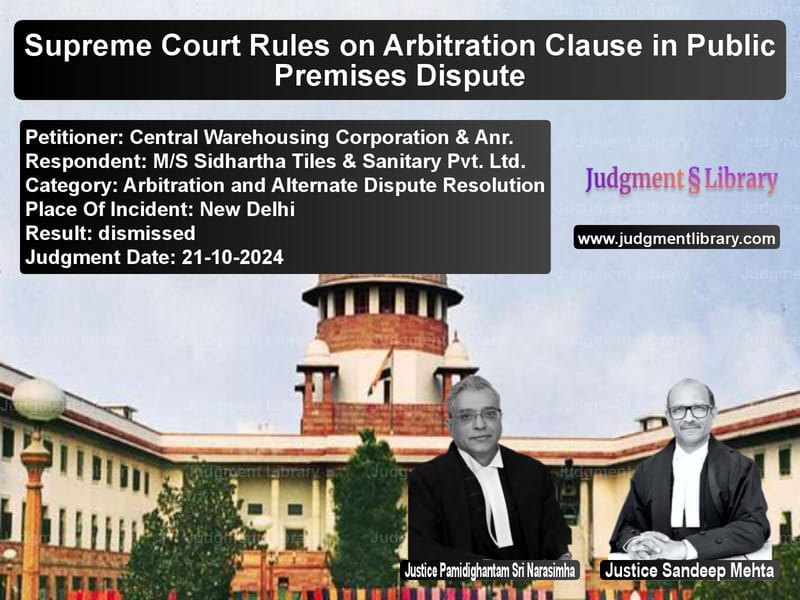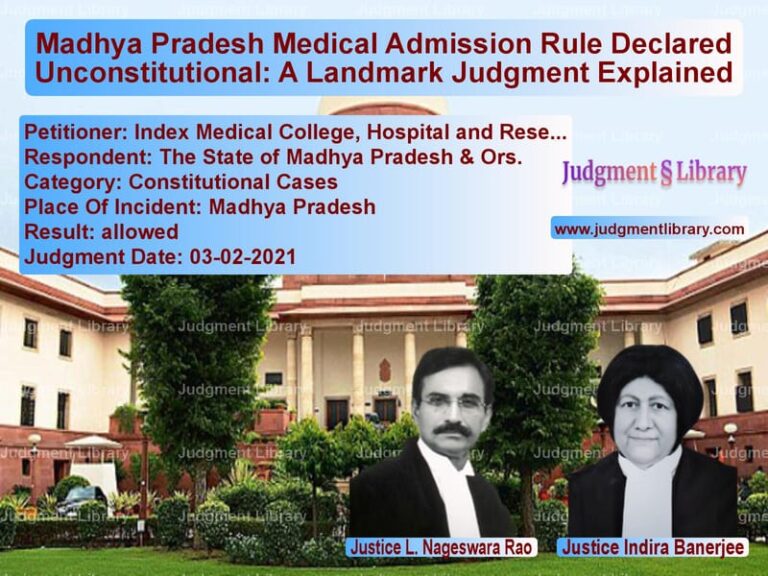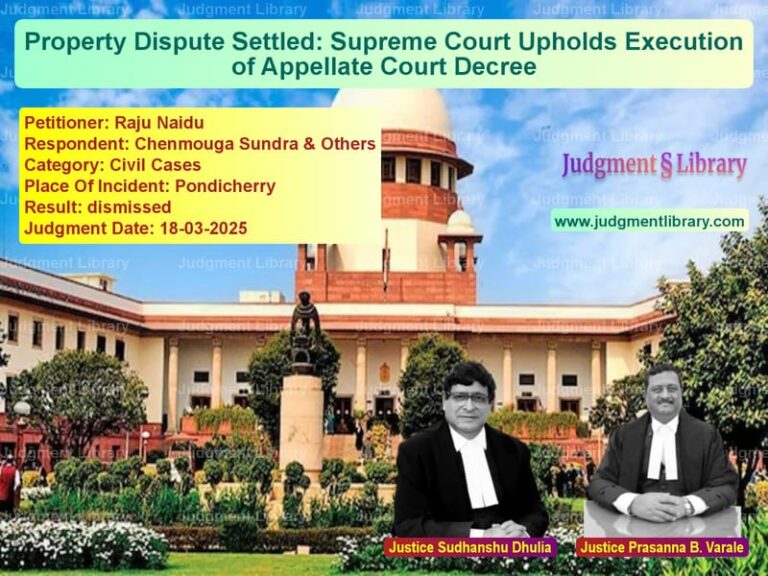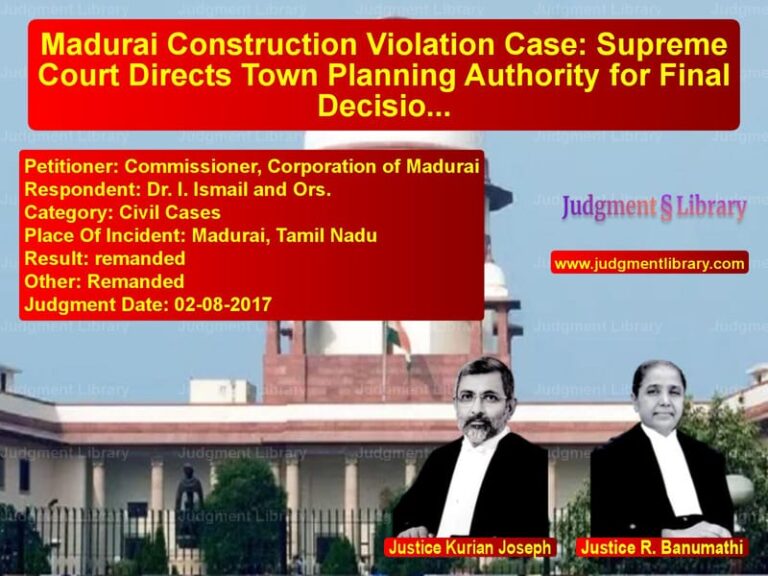Supreme Court Rules on Arbitration Clause in Public Premises Dispute
The case of Central Warehousing Corporation & Anr. vs. M/S Sidhartha Tiles & Sanitary Pvt. Ltd. revolved around the applicability of an arbitration clause in a lease agreement, particularly in relation to the Public Premises (Eviction of Unauthorised Occupants) Act, 1971. The Supreme Court had to decide whether the dispute over lease renewal and increased storage charges fell within the scope of arbitration or should be governed by the Public Premises Act.
Background of the Case
The dispute originated from a warehousing lease agreement executed on September 26, 2012 between the Central Warehousing Corporation (CWC) and M/S Sidhartha Tiles & Sanitary Pvt. Ltd.. The key facts of the case are:
- The respondent leased 1295 square meters of warehouse space from CWC for storing ceramic tiles and sanitary wares.
- The lease was valid for three years from September 12, 2012 to September 11, 2015, with a renewal clause subject to mutual consent.
- The storage charges were initially fixed at Rs. 131 per square meter per month.
- CWC later revised the charges, first to Rs. 157 per square meter in 2012 and later to Rs. 177 per square meter in 2015.
- The respondent expressed willingness to continue the lease but objected to the increased rates.
- When the lease expired, CWC refused renewal and demanded Rs. 16,10,004 in outstanding dues.
- Since the respondent did not vacate the premises, CWC initiated proceedings under the Public Premises Act.
Estate Officer’s Order
The Estate Officer, after considering the submissions, ruled:
- The respondent was in unauthorized possession from September 11, 2015, to November 13, 2015.
- Directed the respondent to pay the outstanding dues as per the demand notice.
Arbitration Petition
Before the Estate Officer’s final ruling, the respondent invoked the arbitration clause in the lease agreement and filed an application under Section 11(6) of the Arbitration and Conciliation Act, 1996, seeking appointment of an arbitrator.
The key disputes raised by the respondent included:
- The legality of the increased storage charges.
- The right to renew the lease under the original terms.
The High Court, after considering the application, appointed an arbitrator and held that the disputes were arbitrable.
Legal Issues Considered by the Supreme Court
- Whether the Public Premises Act, 1971, overrides the Arbitration and Conciliation Act, 1996.
- Whether the High Court was correct in appointing an arbitrator for disputes arising out of the lease agreement.
Petitioner’s (CWC’s) Arguments
The Central Warehousing Corporation contended:
- That the dispute should be governed under the Public Premises Act rather than arbitration.
- The Estate Officer had already ruled on unauthorized occupation and outstanding dues.
- Arbitration cannot be invoked for matters falling under a special statute like the Public Premises Act.
- Since eviction had already been adjudicated under the Public Premises Act, arbitration could not be used as an alternative.
Respondent’s Arguments
M/S Sidhartha Tiles & Sanitary Pvt. Ltd. countered:
- The disputes over storage charges and lease renewal arose before the lease expired and were not covered by the Public Premises Act.
- The arbitration clause in the lease agreement explicitly covered all disputes relating to the contract.
- The arbitration application was filed before eviction proceedings, making it valid.
Supreme Court’s Observations
1. Applicability of the Public Premises Act vs. Arbitration Act
The Court held that the Public Premises Act applies strictly to eviction and recovery proceedings but does not extend to disputes arising from the lease agreement:
“The Public Premises Act authorizes the ejectment of a tenant in unauthorized occupation but does not govern disputes arising before lease expiry.”
Thus, disputes over rent revision and lease renewal were not covered under the Public Premises Act.
2. Scope of the Arbitration Clause
The Court noted that the arbitration clause in the lease agreement clearly covered all disputes arising from the agreement. Referring to SBI General Insurance Co. Ltd. vs. Krish Spinning, the Court stated:
“Where a valid arbitration clause exists, courts should refrain from interfering unless there is a statutory bar.”
3. Legality of Increased Storage Charges
The Court observed that the increased rates were unilaterally imposed by CWC, and the respondent’s objections were legitimate. These issues required interpretation of contractual obligations, making arbitration the appropriate forum.
Final Judgment
The Supreme Court ruled:
- The appeal was dismissed, upholding the High Court’s order appointing an arbitrator.
- Disputes over rent increase and lease renewal were arbitrable.
- The Public Premises Act did not override the Arbitration Act in this case.
- The arbitral tribunal should resume proceedings immediately and expedite the award.
Conclusion
The Supreme Court’s ruling in Central Warehousing Corporation & Anr. vs. M/S Sidhartha Tiles & Sanitary Pvt. Ltd. establishes key legal principles:
- The Public Premises Act governs eviction and recovery, but disputes over lease terms and financial obligations remain arbitrable.
- Courts should uphold arbitration clauses unless a statute explicitly prohibits them.
- Landlords cannot unilaterally impose rent increases without contractual justification.
This judgment strengthens the enforceability of arbitration agreements in lease contracts, ensuring that commercial disputes are resolved efficiently and in accordance with contractual commitments.
Petitioner Name: Central Warehousing Corporation & Anr..Respondent Name: M/S Sidhartha Tiles & Sanitary Pvt. Ltd..Judgment By: Justice Pamidighantam Sri Narasimha, Justice Sandeep Mehta.Place Of Incident: New Delhi.Judgment Date: 21-10-2024.
Don’t miss out on the full details! Download the complete judgment in PDF format below and gain valuable insights instantly!
Download Judgment: central-warehousing-vs-ms-sidhartha-tiles-supreme-court-of-india-judgment-dated-21-10-2024.pdf
Directly Download Judgment: Directly download this Judgment
See all petitions in Arbitration Awards
See all petitions in Dispute Resolution Mechanisms
See all petitions in Contract Disputes
See all petitions in Settlement Agreements
See all petitions in Judgment by P.S. Narasimha
See all petitions in Judgment by Sandeep Mehta
See all petitions in dismissed
See all petitions in supreme court of India judgments October 2024
See all petitions in 2024 judgments
See all posts in Arbitration and Alternate Dispute Resolution Category
See all allowed petitions in Arbitration and Alternate Dispute Resolution Category
See all Dismissed petitions in Arbitration and Alternate Dispute Resolution Category
See all partially allowed petitions in Arbitration and Alternate Dispute Resolution Category







